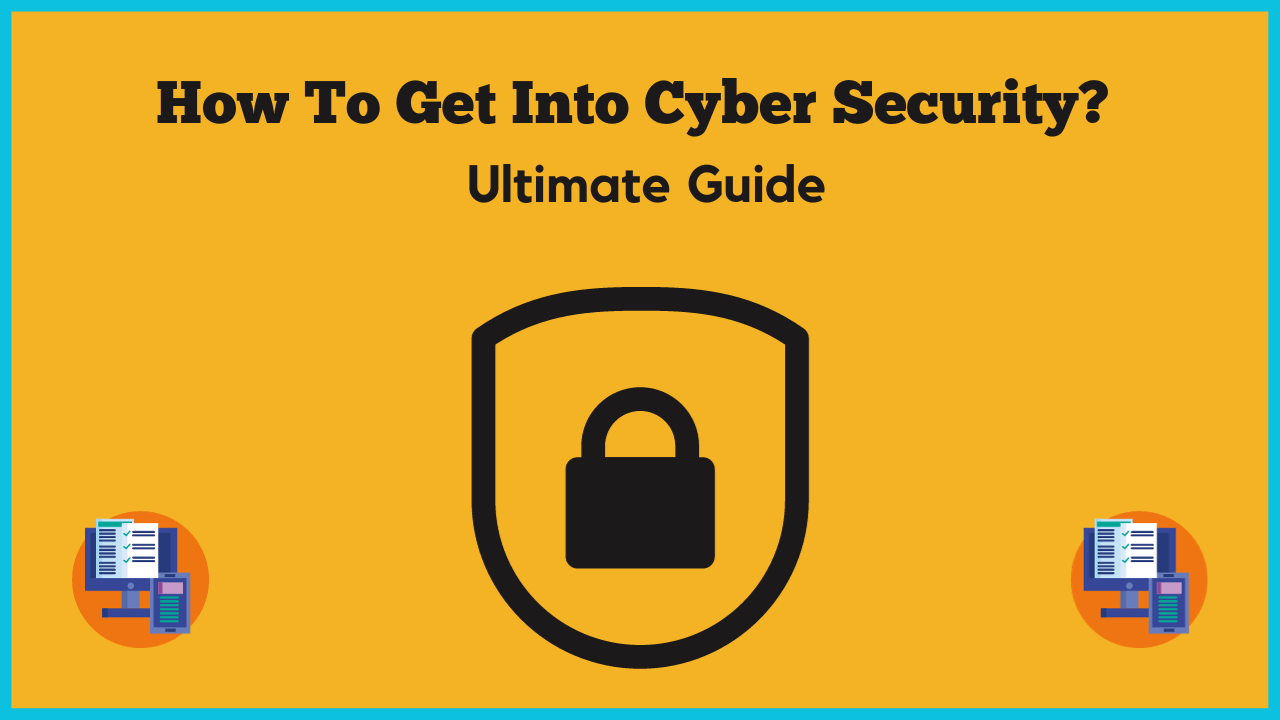In this blog, we will see Navigating the Cyber Frontier by exploring the Comprehensive Guide on How to Get Into Cyber security?
In the digital age, where technology underpins nearly every facet of our lives, the field of cyber security stands as a formidable guardian against the ever-growing landscape of cyber threats.
If you’re intrigued by the idea of protecting digital assets, combating cybercrime, and ensuring the integrity of information, venturing into cyber security can be a rewarding and impactful career choice.
In this comprehensive guide, we’ll explore the steps and strategies to help you embark on the exciting journey of entering the field of cyber security.
What is Cyber Security?
Cyber security is a multidisciplinary field dedicated to safeguarding digital systems, networks, and data from unauthorized access, attacks, and damage.
In an era dominated by interconnected technologies and the widespread exchange of information, cyber security is of paramount importance to protect individuals, organizations, and governments from the ever-evolving landscape of cyber threats.
It encompasses a wide range of practices, technologies, and measures designed to ensure the confidentiality, integrity, and availability of digital assets.
This includes deploying firewalls, encryption protocols, intrusion detection systems, and implementing robust security policies.
Cyber security professionals continually engage in proactive strategies to stay ahead of cybercriminals, responding to emerging threats and vulnerabilities to maintain the resilience and security of the digital ecosystem.
In essence, cyber security is an essential shield against the risks and challenges posed by the dynamic and interconnected digital world.
Rented Article: What is Cyber Security? – Comprehensive Guide
Top Things to Get into Cyber Security
Embarking on a journey into cybersecurity involves mastering coding languages, acquiring hands-on experience with ethical hacking tools, staying updated on the latest cyber threats, and obtaining relevant certifications to establish a strong foundation in this rapidly evolving field.
Here Are the Top Things to Get into Cyber Security with easy way:
1. Understanding the Landscape:
Before diving into the realm of cyber security, it’s crucial to understand the diverse nature of the field.
Cybersecurity is not a monolithic entity; it comprises various specializations, each addressing specific aspects of digital security. Common areas include:
- Network Security: Focuses on securing computer networks from unauthorized access, attacks, and vulnerabilities.
- Penetration Testing (Ethical Hacking): Involves simulating cyberattacks to identify and rectify security weaknesses.
- Incident Response and Forensics: Deals with managing and mitigating security incidents, as well as analyzing and collecting evidence for investigations.
- Security Analysis and Research: Involves researching and analyzing emerging threats and vulnerabilities to develop effective countermeasures.
- Governance, Risk, and Compliance (GRC): Addresses the strategic aspects of cyber security, ensuring organizations adhere to regulations and best practices.
2. Developing the Right Skills:
To establish a foothold in cyber security, cultivating a specific set of skills is paramount.
Here are key skills that aspiring cybersecurity professionals should focus on:
- Networking Fundamentals: Gain a solid understanding of networking concepts, including TCP/IP, routing, and subnets.
- Operating Systems Knowledge: Be proficient in both Windows and Linux operating systems, understanding their security features and configurations.
- Programming and Scripting: Learn programming languages such as Python and scripting languages like Bash to automate tasks and analyze security data.
- Cyber security Tools: Familiarize yourself with popular cyber security tools such as Wireshark, Metasploit, and Snort. Hands-on experience with these tools is invaluable.
- Ethical Hacking Skills: Develop the ability to think like a hacker by engaging in ethical hacking activities, including penetration testing and vulnerability assessments.
3. Educational Pathways:
Several educational paths can pave the way for a career in cyber security:
1. Bachelor’s or Master’s Degrees in Cybersecurity or Related Fields:
Pursue formal education in cyber security, computer science, or information technology.
2. Certifications:
Obtain industry-recognized certifications to validate your skills. Certifications like CompTIA Security+, Certified Information Systems Security Professional (CISSP), and Certified Ethical Hacker (CEH) are widely recognized.
3. Online Courses:
Leverage online platforms such as Coursera, edX, and Udemy to access cyber security courses and specializations.
4. Building Practical Experience:
Theory alone is insufficient in the dynamic field of cyber security.
Hands-on experience is crucial for developing practical skills:
1. Set Up a Home Lab:
Create a virtual or physical lab environment to practice networking, system administration, and security configurations.
2. Participate in Capture The Flag (CTF) Challenges:
Engage in online CTF challenges to solve real-world cyber security problems and enhance problem-solving skills.
3. Internships and Entry-Level Positions:
Seek internships or entry-level positions in IT or security-related roles to gain practical experience in a professional setting.
5. Networking and Community Engagement:
Building a professional network within the cyber security community is instrumental for both learning and career opportunities:
1. Join Online Communities:
Participate in cyber security forums, subreddits, and social media groups to connect with professionals, seek advice, and stay informed about industry trends.
2. Attend Conferences and Meetups:
Attend cyber security conferences and local meetups to network with professionals, learn from experts, and stay updated on industry developments.
3. Mentorship:
Seek mentorship from experienced professionals in the field. Mentorship can provide valuable guidance and insights into navigating the cyber Security landscape.
6. Securing Certifications:
Certifications are tangible proof of your expertise and can significantly enhance your credibility in the job market:
1. CompTIA Security+:
A foundational certification covering essential cyber security concepts.
2. Certified Information Systems Security Professional (CISSP):
A globally recognized certification for professionals with advanced skills in information security.
3. Certified Ethical Hacker (CEH):
Focuses on ethical hacking skills, providing practical knowledge of penetration testing and vulnerability assessments.
7. Develop a Specialization:
Cyber security offers a broad array of specializations.
Tailor your skill set to align with your interests and career goals:
1. Penetration Testing Specialist:
Focus on identifying and fixing security vulnerabilities through ethical hacking.
2. Incident Responder:
Specialize in managing and mitigating security incidents.
3. Security Analyst:
Analyze and research emerging threats and vulnerabilities.
4. Security Consultant:
Provide strategic guidance on cyber security governance, risk, and compliance.
8. Stay Informed and Adapt:
The field of cybersecurity is ever-evolving, and staying informed about emerging threats and technologies is essential:
1. Read Industry Blogs and News Outlets:
Follow reputable cyber security blogs, news outlets, and publications to stay updated on the latest trends and threats.
2. Continuous Learning:
Embrace a mindset of continuous learning. Attend webinars, workshops, and online courses to stay ahead of the curve.
Top Certification To Excel in Cyber Security
Several certifications are highly regarded in the field of cybersecurity, validating the expertise and skills of professionals.
Some of the top certifications include:
- Certified Information Systems Security Professional (CISSP): Widely recognized, CISSP certifies expertise in designing, implementing, and managing a robust cybersecurity program.
- CompTIA Security+: This entry-level certification covers fundamental security concepts and is an excellent starting point for individuals entering the cybersecurity field.
- Certified Ethical Hacker (CEH): Offered by EC-Council, CEH certifies individuals in ethical hacking techniques, providing skills crucial for identifying and addressing vulnerabilities.
- Offensive Security Certified Professional (OSCP): For hands-on practitioners, OSCP assesses penetration testing skills and is well-respected in the cybersecurity community.
- Cisco Certified CyberOps Associate: Focused on security operations and monitoring, this Cisco certification validates skills in threat detection and response.
- Certified Information Security Manager (CISM): Geared towards information security management, CISM is ideal for professionals involved in developing and managing an enterprise’s information security program.
- Certified in Risk and Information Systems Control (CRISC): Offered by ISACA, CRISC certifies individuals in risk management and control to bridge the gap between IT and business objectives.
- GIAC Security Essentials (GSEC): This certification covers a wide range of security topics, providing a comprehensive understanding of information security.
- Certified Cloud Security Professional (CCSP): Co-developed by (ISC)² and Cloud Security Alliance, CCSP certifies professionals in cloud security best practices.
- Certified Incident Handler (GCIH): Focused on incident response and handling, GCIH is offered by GIAC and is valuable for professionals dealing with cybersecurity incidents.
These certifications not only validate skills but also demonstrate a commitment to ongoing professional development, making certified individuals highly sought after in the competitive field of cybersecurity.
Conclusion:
Embarking on a career in cyber security is a dynamic and rewarding journey.
By focusing on developing the right skills, pursuing education and certifications, gaining practical experience, and actively engaging with the cyber security community, you can position yourself for success in this ever-evolving field.
Remember, cybersecurity is not just a career; it’s a commitment to safeguarding the digital world against evolving threats and challenges.
With dedication and continuous learning, you can thrive in the exciting and impactful realm of cyber security.
Related Article: What are The Features of Cyber Security? – Ultimate Guide

Cyber Security Team a group of seasoned experts dedicated to the fields of cybersecurity and internet security. Comprising cybersecurity maestros, this team shares valuable insights, best practices, and the latest trends. Their mission is to empower readers in navigating the complex landscape of online security. Stay informed and secure with the expertise of our cyber guardians.









